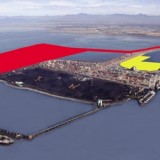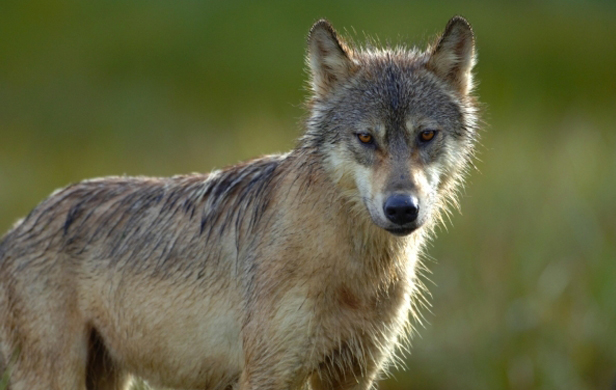Oh No! The port propaganda machine is back and here we go again with a barrage of falsehoods. Consultants are being paid megabucks to convince us that another expansion is needed at Deltaport, Roberts Bank, involving a new terminal with 3 new berths in order to double container capacity.
Increased container capacity expansion at Deltaport is not needed. Port Metro Vancouver has never done a proper “needs assessment”. Credible “feasibility studies” were not part of the process for the last Deltaport expansion or the South Fraser Perimeter Road. Port Metro Vancouver justified construction of the Third Berth at Deltaport – completed in 2010 – with mythical forecasts of increased container traffic. Even the lowest case prediction of 2.8 million TEUs for 2010 was not realized. The total for 2010 was just 2.5 million TEUs.
Now the spin-doctoring is back. We are told we need a new terminal at Deltaport because Vancouver container traffic will triple to 7.5 TEUs by 2030. Well guess what? B.C. already has enough potential to handle this increase in container traffic if we include the Port of Prince Rupert. Port Metro Vancouver has the potential to handle 6.7 million TEUs with efficiency improvements and without a new terminal at Deltaport. Prince Rupert has the potential to expand and handle 5 million TEUs. That would more than quadruple our current container traffic.
Expansion at Prince Rupert is cheaper for taxpayers as the infrastructure for moving containers across B.C. is already in place. In addition, expansion at Prince Rupert does not threaten farmland, migratory birds of the Pacific Flyway, resident orcas, and critical Fraser River fish habitat.
The current world economy makes it anyone’s guess just how the container business will unfold. Canada does not need the Roberts Bank Terminal 2 – now, or anytime in the foreseeable future. B.C. container ports have capacity to handle container volumes for years to come without damaging the habitat at the mouth of the mighty Fraser.
Port Metro Vancouver is still dreaming about its proverbial ship coming in. Meanwhile, the managers proceed to build and expand without accountability to the economy, the environment or the public. You may ask why this is happening. The answer is simple. Port Metro Vancouver, associated crown corporations, and government-friendly corporations are accountable to no one. They plot, lobby, and make deals with our governments to use up public assets and taxpayers’ dollars. Unlike real businesses, they do not suffer losses because it all falls on the taxpayers. If the business doesn’t materialize, they lose nothing. In fact, they make huge profits from contracts, lucrative land deals, rezoning and real estate developments that are associated with port expansion. Once cooperative politicians and bureaucrats leave their jobs, they find themselves well situated on various Boards and in associated private companies.
In 2009, B.C. Rail spent $15 million of taxpayers’ money to purchase large tracts of the Agricultural Land Reserve along the Deltaport corridor. This was six years after B.C. Rail had been sold. A government-friendly non-profit organization has strangely managed to acquire four properties of the Agricultural Land Reserve along the Deltaport/South Fraser Perimeter Road corridor. One property appears to be a great location for a future rail yard. Also, the Emerson Group, which specializes in industrial properties, has been purchasing options on Agricultural Land Reserve properties near the Deltaport corridor. Put all of this, and Tsawwassen First Nation plans, on a map and you will find a blueprint for transforming the Agricultural Land Reserve into an industrial, commercial and residential corridor stretching from Deltaport to the waterfront.
The federal and provincial governments are involved in all these sweetheart deals. In 2006, the B.C. Government removed environmental protection from 2,852 acres of crown waterlot at Roberts Bank and gave the property to the federal government to be managed by Port Metro Vancouver for port development. Previously, this environmentally sensitive property surrounding Deltaport was earmarked to become part of the Roberts Bank Wildlife Management Area. Other give-aways of crown waterlots for port development at Roberts Bank bring the total to well over 5,000 acres. There are plans to remove another 665 acres of protected waterlot for Terminal 2.
The federal and provincial governments cooperate by paying lip-service to environmental assessment laws. They offer assistance to crown corporations and ignore excellent reports by government scientists. Emails from 2004 reveal that lawyers from the federal Department of Fisheries and Oceans advised Port Metro Vancouver how to avoid an Independent Review Panel of port expansion at Deltaport. Government agencies are supposed to facilitate an independent assessment, not conspire with proponents. Thanks to their assistance, the port held a lesser type of environmental assessment. Concerns raised by the public and government scientists were then easily ignored.
The rubber stamp came out again for the environmental assessment of the South Fraser Perimeter Road. Both levels of government failed to disclose the important fact that the project would be built on federal lands with species at risk. This is in contravention of the Canadian Environmental Assessment Act and the Species at Risk Act. The implications are far-reaching as the public was denied due process and Environment Canada was denied any decision-making powers. Also, in a highly irregular process, an additional environmental assessment addressing the issue of species at risk on federal lands took place six months after the project was approved.
Mitigation is a joke undertaken by contractors. Government permits for construction are easily acquired. Compensation money goes to government-friendly organizations who dabble in environmental improvements which are based on little or no science. They do not begin to make up for the loss of salmon, orca and migratory bird habitat. They do not begin to address concerns raised by government scientists during the environmental assessments of the Deltaport Third Berth.
There are no substantive advantages to these developments. Maybe they will create more jobs but how many of them are temporary jobs paid with money borrowed by taxpayers? The provincial Liberal Government increased taxpayer-supported debt for transportation by 80% between 2001 and 2010. Obligations for contracted transportation projects which are taxpayer-supported and supposedly self-supported (i.e. fees, toll, etc for taxpayers) add up to $16 billion.
Further port expansion at Deltaport is a bogus deal that will be lucrative for a few and expensive for taxpayers. How can we, in all conscience, do this to the Fraser River estuary where we had plans to protect Canada’s major stopover for millions of migratory birds of the Pacific Flyway? Despite recognition of the Fraser River delta as the most Important Bird Area in Canada and despite signing three international bird habitat conservation treaties, our governments are willing to forfeit this international treasure and hand over public treasures to be destroyed by unaccountable crown corporations and their friends.
Are we, the people, going to allow this disgrace?
Susan Jones in a longtime resident of Tsawwassen.



